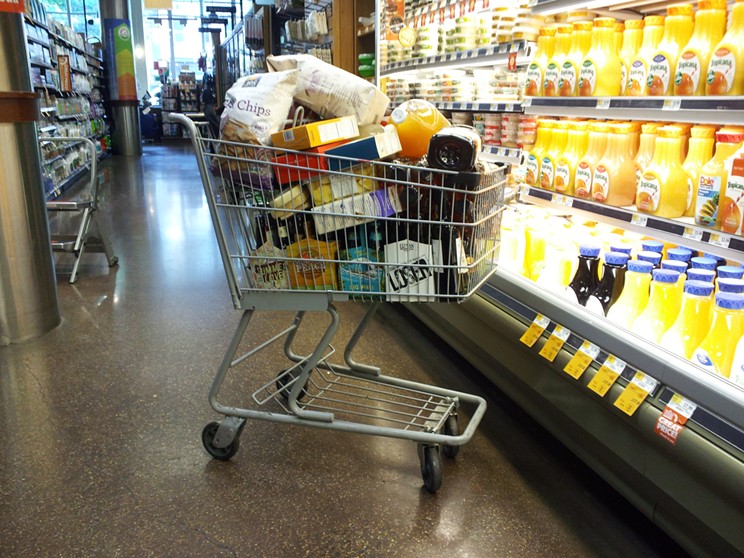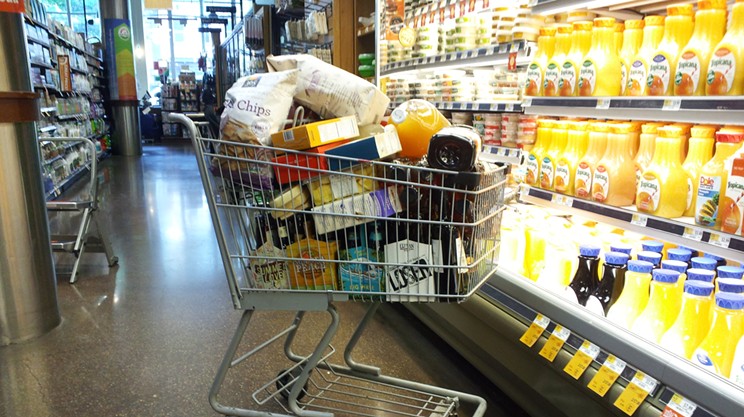Last summer, for the first time in her career as program and outreach coordinator at Halifax’s Brunswick Street Mission, Cassie Sinyerd and her colleagues did something they wish they never had to: They started capping how many people their food bank program served every week. Nestled between Proctor and Nora Bernard Streets, the Mission has provided food, clothing and drop-in supports in Halifax’s north end for much of the past century.
“Our mandate is really broad,” Sinyerd tells The Coast. “It’s to support folks who live in poverty.”
But after hitting a peak of 75 households accessing the Mission’s food supports in a week, and facing limited staff and resources, the nonprofit opted to set its cap at 60 households per week. The Mission also narrowed its food bank’s focus to supporting people living in the north end. Staff manage service Tuesday through Thursday.
The old free-for-all method “wasn’t a good way of delivering service,” Sinyerd says. The level of need has outpaced the community supports in place. Even if the food bank was open five days a week, “we’d fill up,” she adds. “We’d just be at capacity all the time.”
What’s more troubling to Sinyerd and other food bank providers? Food insecurity across Nova Scotia appears only to be growing. And based on the latest Canada-wide food inflation report, it’s a trend that—absent intervention—shows little signs of slowing.
Grocery costs up 10.3% in Nova Scotia since last February, StatsCan reports
A $100 grocery bill ain’t what it used to be. Per Statistics Canada’s latest report on food prices, released Tuesday, the cost of groceries in Nova Scotia continued to climb in February, up 0.6% from January—or the equivalent of 60 cents on a $100 grocery bill. Year-over-year, that same $100 grocery bill has gone up by $10.30 since last February. And while some items—including meat prices—dropped from January to February, other staples have gotten more expensive: Fish, cheese, eggs, fruit and cereal products all saw price increases last month.
As grocery prices have climbed, so too has the number of Nova Scotians struggling at the checkout line. According to Feed Nova Scotia, which distributes food to food banks, meal programs and shelters across the province, roughly one in six Nova Scotia households are food insecure. (The Coast partners annually with Feed Nova Scotia for Burger Bash, which has raised more than $760,000 to date for Feed Nova Scotia initiatives.)
Last year, 46,000 Nova Scotians sought support from food banks. In 2021, that number was closer to 37,400. And while the province’s population is on the rise—in 2022, Nova Scotia cracked the million mark for the first time in its history—the demand for food support has well exceeded the province’s growth. From 2021 to 2022, Nova Scotia’s population grew by less than 3%; in the same time span, the demand for food banks rose by 23%.
From 2021 to 2022, Nova Scotia’s population grew by less than 3%; in the same time span, the demand for food banks rose by 23%.
tweet this
That juxtaposition found its way into question period as MLAs returned to Province House on Tuesday. Nova Scotia Liberal leader Zach Churchill took premier Tim Houston to task for the province’s absence of measures to ease the effects of inflation, noting that Nova Scotians are expected to pay $1,000 more on their groceries this year compared to last.
“This is despite the fact that the deputy premier told us that inflation would just go away,” Churchill said. “My question to the premier is when will this government take action to help Nova Scotians with inflationary pressures?”
Houston countered that inflationary pressures are North America-wide, not limited to Nova Scotia—and he lay blame at the federal Liberal carbon tax, “which is barrelling down… towards us,” as the reason for Nova Scotia’s financial difficulties. He pointed to his government’s home heating rebates as evidence of his administration looking out for Nova Scotians.
“We are taking definitive action, Mr. Speaker,” Houston said. “And we will continue to take definitive action.”
Want to end food insecurity? Try a universal basic income, advocates say
If Houston or his federal counterparts wanted to make a real dent in Nova Scotia’s food insecurity problem, there’s one option on the table that Sinyerd argues is worth exploring: A universal basic income. It’s an issue that Halifax regional council has raised as well. Last year, councillor Waye Mason initiated a motion for mayor Mike Savage to write a letter to the prime minister and Nova Scotia’s premier, urging his peers to implement a guaranteed income system “ensuring everyone has sufficient income to meet their needs, which would go a long way towards eradicating poverty and homelessness, alleviating the pressure on municipalities to use their limited resources to fill gaps in our failing social safety net.”
Councillors voted 10-2 in favour of the motion. But if prime minister Justin Trudeau or Houston were moved by Savage’s letter, well, we haven’t seen evidence of it yet.
That’s a missed opportunity, according to Sinyerd.
“We know, statistically, the food bank usage plummeted when folks were collecting [the Canada Emergency Response Benefit],” she says of the now-ended COVID support, speaking by phone with The Coast. “We also know that when people can choose to purchase their own food, they do.”
She’s not alone in her assessment. According to a 2022 Food Banks Canada report that polled over 460 agencies across the country, nearly two-thirds of those surveyed said they felt CERB benefits had the “most significant impact” on lowering food bank demand during the early years of the pandemic.
And while Sinyerd and her peers at Brunswick Street Mission are passionate about the work they do, she knows that the solution to Nova Scotia’s food crisis extends beyond the doors of any single food bank or community agency.
“Our food bank system here [in Nova Scotia] still assumes that folks have most of what they need for food—and so it exists to complement what they already have,” she says. “Where we know that’s just not the truth.”


